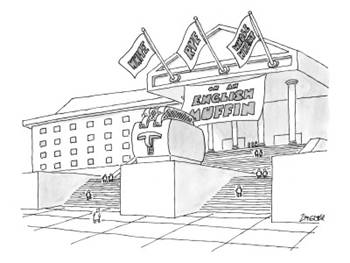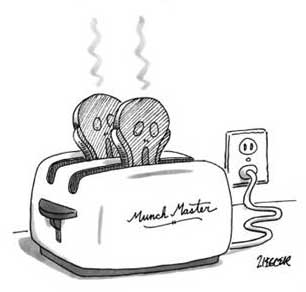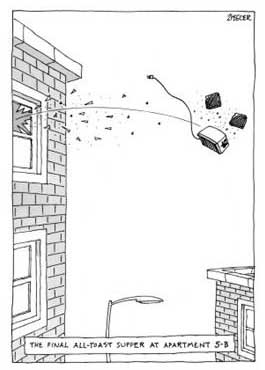LETTERS FROM THE GLOBAL PROVINCE
You're Toast (If You Don't Know What You Have to Get Right), Global Province Letter, 7 December 2011
You're Toast. You're Toast, we are told, means you are in trouble. To us it has always meant much more than that. Why, we are sure, it really means, "You are up a creek without a paddle!" You are in an imbroglio where there is no exit. There's no going back and there's no going forward. You've lost. The game is up, and you might as well grin and bear it.
 This pretty much describes the situation in which Americans now find themselves. They're between a rock and a hard place. They enjoy no financial security and bemoan their declining standard of living, a quandary stemming from the shenanigans of their leaders, the politicians having declared open hunting season for financial predators, and amoral businessmen aplenty having feasted on the easy pickings this corrupt governance has presented. While the investment and commercial bankers, and particularly the under-taxed private equity managers, have driven us over the cliff, battalions of others outside the financial sector have happily gone along with their wholesale larceny.
This pretty much describes the situation in which Americans now find themselves. They're between a rock and a hard place. They enjoy no financial security and bemoan their declining standard of living, a quandary stemming from the shenanigans of their leaders, the politicians having declared open hunting season for financial predators, and amoral businessmen aplenty having feasted on the easy pickings this corrupt governance has presented. While the investment and commercial bankers, and particularly the under-taxed private equity managers, have driven us over the cliff, battalions of others outside the financial sector have happily gone along with their wholesale larceny.
Trying to Get the Wrong Things Right. Since we were knee high to a grasshopper, we have loved cheese dreams and cinnamon toast. In this age of ultra-finicky, designed-to-death cuisine and high tech new-age cooking, you don't hear much about them. Nine out of 10 breakfast places don't even know what cinnamon toast is and assume it is the cinnamon bread you buy at the super. The recipes for dreams or cinnamon toast you find on the net are about half right, roadmaps to the mediocre. Don't even dare to ask modern cuisine-hip Americans about chipped beef, Philadelphia scrapple, and other staples of Americana.
It is bad enough that cooks get the ingredients wrong or mess up the proportions for these simple, inexpensive, old-time delectables. Worse yet, they never get the toast right, often using thick, pasty overwrought bread. They are totally bereft of any concept of how to toast bread. Traditional thin white American bread, despised by the new bakers of over-engineered loafs, is rather essential. And, while the bread should be thoroughly toasted (it often comes out barely warm at restaurants), it should be unevenly warmed so as to create a variable texture. Bland, uniform toasting is the stuff of decorative chefs more devoted to looks than taste: toast made this way is the equivalent of chemlawns that give the look of synthetic astroturf to so many modern American homes. Cheese dreams and cinnamon toast are a little rough around the edges, and it is from this peasant character that they derive extra taste and texture. The best toast in fact comes from old fashioned toasters that only cook two slices: there is no pop up or temperature gauge: one just watches attentively to pull the toast out of the toaster at the right moment. You had best hearken back to the 1934's Manning-Bowman 790 for a hint as to how you should be toasting.
The good cheese dream or the right cinnamon toast does not depend on layers of ingredients or technology that produces tasteless uniformity. But you've got to get the toast right. Likewise, a healthy financial sector does not depend on complicated financial instruments and endless financial intermediaries. It springs from financial institutions with heaps of capital that have to hold on to the loans they make and that don't make most of their profits from risky trading activities.
Gardner on the Toaster Project. Just last week, Eric Gardner did a witty piece on "Perfecting the Toaster" for the Wall Street Journal. It was so good that we went on to warn Gardner that chaps at the Journal start witty but then they turn pompous, serious, and obsessed with small ideas. They become like horses with blinders on that no longer pick the daisies. He promises to hang loose and stay droll.
Anyway, he reported on a Brit's attempt to bring perfection to toasters. Which, of course, is a contradiction. For toasting is about artful imperfection. It is not about cranking up a robot to spew out astroturf. All the over-engineering in expensive Williams and Sonoma toasters designed to produce perfection is not bringing the taste out in bread.
 Toaster frustration, by the way, is one of the overwhelming domestic neuroses that psychiatrists (what do they know?) never remark about. We have sprinkled Jack Ziegler and Arnie Levin (1) toaster cartoons from the New Yorker throughout this letter to let you know just how pervasive toasteritis is. As we've said, toaster makers have aroused the wrong expectations of what toasters can and should do, not unlike the guys who make dysfunctional cell phones, cars, desktop computers, and a host of other badly functioning appliances. Oooops, we forgot dishwashers. Is it man's fate to be barking up the wrong tree?
Toaster frustration, by the way, is one of the overwhelming domestic neuroses that psychiatrists (what do they know?) never remark about. We have sprinkled Jack Ziegler and Arnie Levin (1) toaster cartoons from the New Yorker throughout this letter to let you know just how pervasive toasteritis is. As we've said, toaster makers have aroused the wrong expectations of what toasters can and should do, not unlike the guys who make dysfunctional cell phones, cars, desktop computers, and a host of other badly functioning appliances. Oooops, we forgot dishwashers. Is it man's fate to be barking up the wrong tree?
Getting a Simple Thing Right. A friend of ours, an electronics design engineer with artistic breadth, one Peter Kindlmann, has written us about what you do have to get it right in a toaster, not harping on the million things that toaster companies work on to add more price into the product:
The classic electro-mechanical toasters had a clever approach to generating the toasting time interval, with a view to repeat toasting. The time interval was determined by a separate little heater and a bi-metallic element. But when that element got hot, it didn't trip a switch to turn off the toaster; it just turned off its own little heater with an intermediate click one could hear. Then it cooled down, and that ended the toasting cycle. That is, in engineering lingo, the sequence was one where the system's final state was the same as its initial state. So it was all ready to do the toasting again in exactly the same way, defining the same time interval, unencumbered by any "hangover" from the previous cycle.
A cheap toaster Marcia, my wife, once bought had saved itself the complexity of this up-down timing cycle, and just used the "up" part. So putting in the next batch of toast immediately after the previous one toasted it hardly at all, because the timing element had hardly begun to cool down.
The up-down idea is an important circuit design principle, not just for the generation of time intervals, but also to avoid a discontinuity between the end of one cycle and the beginning of the next. Such discontinuity can mean disproportionate rapidity and stress, an unwelcome wait, etc. I'm sure you can even think of organizational analogies.
So when one year in one of the circuit design classes I was giving, I found that my analogy to that intermediate click of the toaster produced blank stares. I brought my toaster to the next class to explain and demonstrate. Of course we needed something to toast. With lightning speed, and all the social organizational instincts that Yalies are so good at, one student jumped up, shouting "pop tarts", and as if by advance arrangement others started wrestling out their wallets and gave him dollar bills, which he took to the nearby vending machine and came back with a bunch of pop tarts. So we had repeated demonstrations of toasting cycles with excellent class participation. Pop-Tart design 103.
What you're looking for, then, is a toaster with a good up and down idea. But in this age of cosmetic design and cost-saving product deterioration, you may not have up-and-down, even if there are a lot of dials on the outside. What we have to understand in order to make life work fairly smoothly is what simple thing we have to get right, and not get fooled by all the distractions presented by a society gone awry. 
P.S. The newly minted Noble Prize winner, economist Thomas J. Sargent, fondly remembers a friend and mentor from UC Berkeley who said, "Economics is organized common sense." "I still think that's about right," says Sargent. New York Times, December 4, 2011, P. BU6. Our firm advises a lot of money managers and consultants and sundry other professionals who are trained to over-complicate things in order to make a living. We have to burrow in to find out the one thing that has to be done right in order to make their businesses a bit sounder.
P.P.S. It is with some pleasure that we recently visited the Baguette King in Paris. That's our name for Stephen Kaplan, a wonderful bread nut who mostly hangs out in Paris (i.e, Lutetia), and is widely renowned for being a catalyst in the revival of French bread. Please understand that only some French bread has risen from the lower depths: there is still plenty of dreck. Some of bread's secrets clearly evade Kaplan. But sitting with him in a bakery-café one morning, we learned a crumb at a time the multiplicity of tastes that can emerge from bread made and prepared and eaten right. He's cheerfully frenetic, ample proof that the leisurely spirit has deserted Paris.
P.P.P.S No Exit is a Sartre play, the output of a French existentialist who probably should have spent more time outside France. Hell, in his view, is to be condemned to a small space and a small society from which there is no escape. Hell here is a bad conversation that has no beginning and no end. Sort of like politics or cable TV.
P.P.P.P.S. The U.S. standard of living has been in decline for 50 years, probably dating back to the Kennedy Administration and the beginnings of our foreign adventurism, which has sapped our financial and intellectual capital and our standing with the peoples of the world. People began to vaguely understand what was happening when it took 2 wage earners to keep the family going, something that became a fact of life at the end of the 20th century. But it is only since 2008 that people have owned up that they are sliding downhill and that their children will have it worse than they did. We have not managed well our entry into the global information economy.
P.P.P.P.P.S. Paul Volcker, a onetime Chairman of the Federal Reserve and a truly honorable man, does know how to put our economy and our financial system right. To its credit, the Obama Administration has followed some of his advice. He counsels us: "What's the subject of life - to get rich? All of those fellows out there getting rich could be dancing around the real subject of life." For him banks would have to become banks again. It would appear that a host of semi-public institutions—banks, utilities, etc.—need to get back to business and give up their gun-slinging excesses.
Home - About This Site - Contact Us
Copyright 2011 GlobalProvince.com